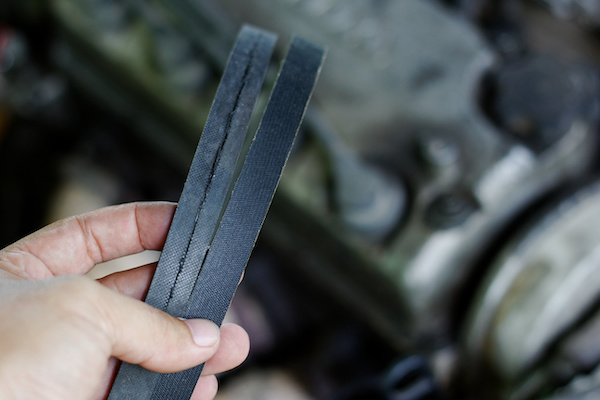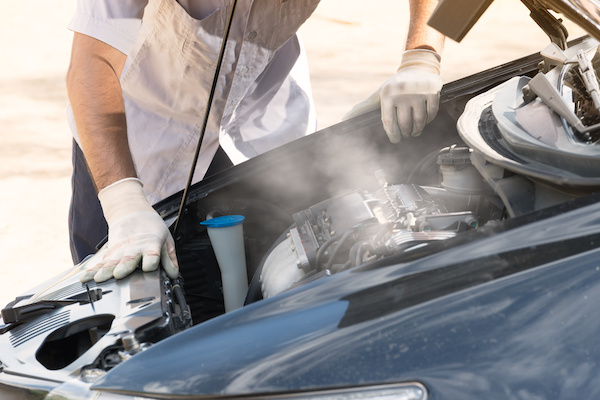Posted on 1/29/2023

As the cold winter weather approaches, it is important to make sure your vehicle is ready for the harsh conditions. To help you stay safe and reliable on the roads this season, we have put together a comprehensive Winter Maintenance Checklist of items that should be inspected before and during the winter months. Winter Auto Maintenance Checklist 1. Battery – Make sure the battery has sufficient charge to start your engine and is securely fastened. Sufficiently charged battery should show a reading of at least 12.4 volts. It ensures that the engine starts without difficulty and that all accessories, such as headlights and windshield wipers, work properly. 2. Fluids – Inspect the engine oil, transmission fluid, brake fluid, coolant, power steering fluid and windshield wiper fluid levels. If any of these is low or contaminated with dirt or debris, it should be replaced for your vehicle to work properly. 3. Tires – Cold weather affects tire pressure more than hot ... read more
Posted on 12/29/2022

The serpentine belt is commonly referred to as the drive belt and it's a vehicle component that connects to the engine via pulleys, tensioners, and idler and powers the alternator, air conditioning, and power steering. In some vehicles, this part also powers the water pump system. And if the drive belt is torn or worn out, it can cause a lot of problems in your vehicle. In this regard, we'll take an in-depth dive and explore some indicators that signify a failing serpentine belt. Unusual Noises from the Front of the Vehicle Strange noises emanating from the front of your vehicle are not a good sign. Mostly, this issue may be a result of faulty or broken serpentine belts. A problem with misalignment or slippage of drive belts may also lead to these noises. If you notice these noises, it's advisable to contact a professional auto shop. Non-Functional AC and Power Steering If the serpentine belt is broken, then the engine itself will have issues. The situation may lead t ... read more
Posted on 11/29/2022
.jpeg)
Most automakers nowadays put way more effort into the creation of your car than ever before. To keep your vehicle working for long periods, they have designed a factory-scheduled maintenance plan, also known as the 30, 60, 90K services. It is important that you are mindful of maintenance. A good rule of thumb to follow is, of course, the 30, 60, 90 rule of maintenance service. The 30, 60, 90K plan in the automotive service industry simply means that you should bring your vehicle into your trusted auto repair shop every 30,000 miles that it has been driven. In essence, it can go up to 120K, 150K, and so forth. This is a good way to keep track of your maintenance and ensures you never miss critical tasks, like transmission flushes and timing belt replacements. It also makes the process of scheduling your appointment with your auto service shop easier. Since every automaker has a set list of items that should be done at the 30,000-mile mark, 60,000-mile mark, and 90,000-mile mark, ther ... read more
Posted on 10/31/2022

A puff of white smoke from your car's bonnet may be distressing and harmful to your vehicle's health. Most modern cars come with a well-structured cooling system that is computer controlled with multiple heat sensors and fans to keep them cool. Still, overheating can happen despite this sophisticated setup. What happens when the engine overheats? When the heat generated by a running engine exceeds the recommended level, your engine will overheat. When this happens, the fans and other cooling components fail. Overheating occurs due to blocked hoses or leaks, radiator problems, mineral deposits, corrosion, and broken water bumps. So what do you do when your engine overheats? Taking the right steps or approach can save you from a completely damaged car when overheating occurs. Consider doing the following when your vehicle overheats. Pull over to a safe place When smoke starts coming from your hood, pull to a safe spot, and turn off the car. Let the engine co ... read more
Posted on 9/29/2022

Have you realized that your car's acceleration is stalled? Does it frighten you that you cannot fully control your vehicle on a highway? Luckily, whatever the issue is with your car, it is fixable. Some of the things that might cause your acceleration to stall include; Transmission Issues have arisen Even when your vehicle is in superb condition, it could occasionally seem slow. The transmission system may have a minor issue that prevents the automobile from shifting when it should. This makes it difficult for your car to speed through a turn or up a hill. Fuel filter blockage If your car's fuel system is the issue, your gasoline pump will have to work harder to function. The passage of fuel into the combustion chamber will be hampered by a blockage. Or perhaps your fuel injector is broken or blocked. In most cases, the injector effectively regulates the gas flow velocity. Fuel supply gets tough if it does not. Or a gasoline pump could be broken. Fuel is transferred into th ... read more